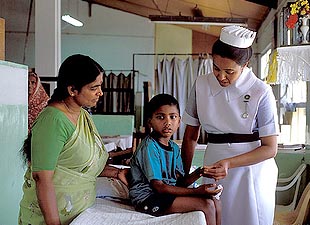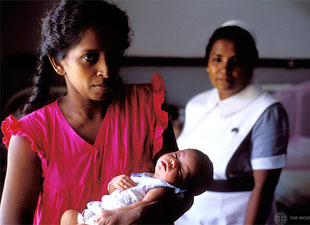
AsianScientist (Apr. 11, 2014) – By T V Padma – The climate change-related risks from extreme events such as floods and heat waves will rise further with global warming, according to the second installment of the latest UN Intergovernmental Panel on Climate Change (IPCC) report. This will aggravate food and water insecurity, especially for some of the poorest communities.
The report of the second working group of the IPCC’s Fifth Assessment Report (AR5), dealing with impacts, adaptation and vulnerability, and offering new insights into key risks due to climate change, was released in Yokohama, Japan.
“Nobody on this planet is going to be untouched by the impacts of climate change,” IPCC chair Rajendra Pachauri warned.
Christopher Field, the co-chair of the second working group, added: “We are not in an era where climate change is some kind of a future hypothetical. We live in a world where the impacts of climate change that have already occurred are widespread and consequential. There is no question that we live in a world that is already altered by climate change.”
The report highlighted many global shifts that climate change has already caused. It said that changing rainfall and melting snow and ice have affected water resources in many regions. Glaciers have shrunk, affecting run-off and water resources downstream. Permafrost is thawing, and wheat and maize yields have fallen in many regions.
The report also repeated warnings about shifts in species’ migratory ranges and the threats this may pose to food security. It also raised concerns about increased human displacement and resulting conflicts.
Impacts in Asia
Asia will be particularly hard-hit by water scarcity, food insecurity, the redistribution of land species and an increased risk to coastal and marine ecosystems, the report said. It predicts that South Asia will be the region most impacted by global warming, due to more extreme weather events such as floods and droughts.
It has “rung warning bells for Asia” and has “very serious implications” for South Asia in particular, said Chandra Bhushan, deputy director at the Centre for Science and Environment, a Delhi-based NGO.
A major reason for the greater impact in the region is its large population of impoverished people, said Bhushan. Bangladesh, India and Pakistan together account for almost half the world’s poor people, he said.
Purnamita Dasgupta, coordinating lead author of the report’s chapter on rural areas, and professor at the Institute of Economic Growth in Delhi, said that the impacts of climate change “will add to the existing vulnerabilities of people in rural areas, such as lack of access to water and infrastructure”.
“We could have more poverty shocks because the poor are already disadvantaged,” she said, adding that climate change acts as a “threat multiplier”.
With 70 percent of people in developing countries living in rural areas, the “rural poor would be impacted through reduced access to water” and “stand to lose whatever assets they have” with a rise in extreme events such as floods and drought, she said.
The report provides scientific evidence on how adaptation could reduce the risks that climate change will pose and how to manage those risks. “We now have enough evidence to show that adaptation is important,” Dasgupta said.
However, it is difficult at this stage to work out the costs of adaptation measures, as few countries are yet to practice it. Nonetheless, Pachauri agreed that the report highlights the urgent need for adaptation and “hopefully restores the balance between the need for both mitigation and adaptation measures” by countries.
He added that there is a huge dearth of local knowledge on the kinds of adaptation needed in particular locations, and on which local institutions could be fully engaged in adaptation policies, practices and corresponding cost estimates. “That is a real gap” in knowledge that experts need to work on, Pachauri said.
Some positive messages
Yet the report said that “adaptation is already occurring” to an extent, as some governments are beginning to embed it in some planning processes.
“One thing that we have come up with is the importance of adaptation and mitigation choices because this is the only way we might be able to reduce the risks of climate change,” Pachauri said at a press briefing.
Camilla Toulmin, director of UK-based research organization the International Institute for Environment and Development, said in a statement: “Some of the world’s least developed countries are already forging ahead. Ethiopia has committed to carbon-neutral development. Bangladesh has invested US$10 billion of its own money to adapt to extreme climatic events. Nepal is the first country to develop adaptation plans at the community level.”
——-
Source: SciDev.Net.
Disclaimer: This article does not necessarily reflect the views of AsianScientist or its staff.












